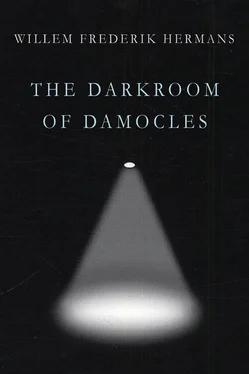‘You’d better hang on to those.’ Labare opened the tin box and rolled a very thin cigarette with pitch-black, hair-like tobacco.
‘So in an emergency,’ he went on, ‘you go straight down to the basement. There are bunks there too. Besides, that’s where all the work is done. It would be safest if you stayed down there permanently, but that’s a bit hard …’ He paused. ‘A bit hard … You might as well come down with me now. Could I see that Leica of yours?’
Osewoudt got out the camera and handed it to Labare. Labare crossed his legs and examined it with head bowed. He kept the roll-up between his lips, the smoke curling around his hollow temples. He was breathing through his mouth and began to cough.
‘Not bad, new model. No close-up lens?’
‘No.’
‘Why not?’
‘I’ve never had one.’
‘Never had one?’ Labare looked at him as if he thought Osewoudt had lost it, or even deliberately destroyed it.
‘So what in God’s name have you been doing with that Leica? Oh well, it’s none of my business.’ His voice tailed off. ‘Rank amateur,’ Osewoudt heard him mutter. Labare stood up with a sigh, then spoke out loud again: ‘And is that Summar the only extra attachment you’ve got? No ninety-millimetre lens?’
‘No.’
‘You obviously have a lot to learn. Follow me.’
Halfway down the stairs to the basement Labare stopped abruptly.
‘Take a look behind you, Melgers.’
Osewoudt turned to look.
‘See that rope?’
Osewoudt saw the rope.
‘If you pull that rope a whole contraption of iron bars comes down behind the door, a kind of grating, but much heftier. So anyone wanting to force the door from the outside has a hard time of it. That’s what it’s for, understand? No, don’t pull the rope now, because once the bars are down it takes more than one man to get them up again. More than two, in fact. The windows in the basement are heavily barricaded too. So that could get very nasty.’
Labare went on down the stairs. ‘Very nasty,’ he repeated. At the foot of the stairs he stopped again, thereby obliging Osewoudt to remain standing one step up. Labare said: ‘As you can see, it’s very cramped here. We have to make the best of what little space we have. So we knocked up all these cubicles from hardboard. What’s in those cubicles and what goes on there is none of your business. None. What would be the point of you knowing, anyway? It never does anyone any good to know about things that are none of their business. No good at all, especially not with the tricky kind of work we do here.’
He began to wriggle his way into one of the narrow passages between the board partitions.
‘Getting around is a bit of a squeeze for me, but it won’t be a problem for a small chap like you. I’ll take you to where you’ll be working, and then I’ll show you where the emergency exit is, too.’
Osewoudt walked, or rather sidled, behind Labare. The passage became so narrow that it was impossible to advance by putting one foot in front of the other in the normal manner. Moving sideways, scraping between the partitions, they came to a black curtain no wider than the passage.
‘You will have noticed,’ said Labare, ‘that every light bulb has a smaller one beside it that isn’t switched on.’ He pointed to the ceiling. ‘Emergency lighting, in case the current fails. We’ve thought of everything. No messing about here.’
He pushed the curtain aside, took a step forwards and then stopped to hold it open for Osewoudt. Osewoudt looked past him.
The cubicle beyond the curtain was painted black all over: ceiling, floor, walls and even shelves, which were stacked with canisters and brown bottles. There was no window, not even a boarded-up window, but there was a small washbasin and a folding bed.
‘In here,’ said Labare, ‘is where you’ll be doing most of your work. I might as well explain right away. This is the darkroom. Nothing like a darkroom for shedding light, eh? Now don’t go thinking that the things that come to light are any business of yours, just concentrate on making it happen. You can do it with your eyes shut, in a manner of speaking.’
He reached for a black ebonite container rather like a jam jar, but slightly wider and not as tall. He removed the cover and took out a reel.
‘This thing is your developing tank. Unfortunately it’s the only one we have, so you can’t develop more than one film at a time, and developing plus washing takes a full hour. All those boxes contain films that need developing. There must be about eighty, as there’s been nobody to process them for the past fortnight or so and new films come in every day. We have a huge amount of documentation. But even when you’ve developed a film you’re not done yet, because you still have to thin it. You probably don’t have a clue about the technical side of photography, like most people who snap merrily away, so I’ll tell you how it works.’
He shut the ebonite container and put it back on its shelf, then leaned back with his elbow resting on the same shelf to facilitate his standing delivery.
‘A film, Melgers, consists of two things, mainly: a strip of celluloid which we call the emulsion base, and on top of that a thin layer of gelatine, which we call the emulsion. The emulsion is the photosensitive layer. Now, in thinning, we separate the emulsion from the base. The problem with that is the instability of the emulsion — once the gelatine falls apart the image is lost. So before we start thinning we have to toughen the gelatine layer.’
He took a bottle from the shelf.
‘This is used for washing the film. When that’s done we can start prying the emulsion off the base. We make sure the gelatine comes off in one piece, without tearing. That gelatine layer is extremely thin. Once it’s properly dry it can be rolled up so tight that it can easily be hidden, inside a propelling pencil for instance. Not that we have any of that romantic stuff going on here. We thin down films mainly to save space. I can’t abide romantic notions of any kind in this business.’
To mark his switch from the technicalities of film processing to philosophy, Labare slid the bottles together on the shelf and rolled himself another cigarette.
‘You must think of this as an ordinary job, you don’t want to get carried away thinking there’s a war on and you’re a hero or anything like that. Obviously, we have to make safety precautions and stick to them, but it’s the same in peacetime, too. Down mines, in chemical factories. That is how you should see our safety precautions, it’s as simple as that. We have no use for heroes. What is a hero? Someone who’s careless and gets away with it. We have no use for careless people. I don’t need men who keep shtum when they’re interrogated by the Germans, but men who’ll spill the beans — it’s a question of making sure they don’t have any beans to spill, that’s all. Because if someone does know something, try holding a burning cigar to his balls and nine times out of ten he’ll talk, and in the one case where he doesn’t, well, he’ll be stuck with burned balls for the rest of his life, which would be too bad.’
Osewoudt cackled shrilly, Labare laughed too, but inaudibly, only moving his lips, and he said in a nasal tone: ‘Yes, my boy, that is how you must think of it.’
He shook his head.
‘If anything happens, the first thing you do is pocket the finished films and switch on the light to expose the rest: they’ll go black. You do that at the first signal. The second signal means it’s time to leg it. I’ll show you how it works.’
Labare put out his cigarette under his shoe and walked off. Osewoudt went after him, this time through another passage, one wide enough to walk down normally. It ended at a door.
Читать дальше












